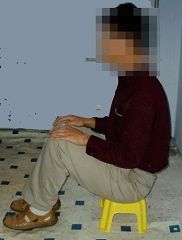Crimes of Brainwashing Committed at Meizhou Prison in Guangdong Province
(Minghui.org) Meizhou Prison in Guangdong Province began imprisoning Falun Gong practitioners in 2004. A 610 Office was established there in 2005 and switched from a mixed schedule of forced labor and brainwashing to a full day of brainwashing. They combined this so-called “studying” with many other measures to form an even more savage and brutal way to persecute practitioners.
The Meizhou Prison put all Falun Gong practitioners in one ward, with each practitioner confined to an area with three to ten other inmates who were assigned to guard him. The assigned inmates are selected drug addicts and dealers, murderers, arsonists, thieves, and rapists who had received death or delayed-death penalties. Monitors are placed in all rooms, corridors, restrooms, and fields. The police can see and control everything from their offices. They persecute each practitioner for two to three months at a time, and the methods are refined about every 15 days. If the practitioner withstands the persecution and doesn't succumb, the persecution breaks for two to three months and starts over again.
1. The “Sitting Stance” that Exceeds Human Physical Limitation

Torture re-enactment: Forced to sit on a small stool for a long time
Meizhou Prison forces the practitioners to sit on a stool measuring 9 inches high and 7 inches in diameter to “study.” The practitioner must keep his lower legs vertical, and hold the book with both hands while resting the forearms on the bunk bed. The back and head must be kept straight. If after about two weeks to a month, the practitioner still does not “transform,” his chair is pulled further away from the bed until his arms are stretched straight with fingers barely touching the bed. The body must be kept still at all times. They even have someone else wash the practitioner's rice bowl to keep him from moving. Essentially, they try to force him to either succumb or “sit” to death. In such a torture, one feels extreme pain in the arms and buttock at first. Then the entire body becomes numb. During night time during sleep, every inch of the practitioner’s muscles and bones is in excruciating pain.
2. Indefinitely Extending the “Study Time”
The brainwashing time for newcomers in Meizhou Prison was between ten to twelve hours per day, including a lunch break. If the practitioner did not “transform” within two weeks to a month, the time is increased to 13-16 hours. If there was still no “improvement,” the time is extended to 16-20-plus hours without a lunch break.
3. The Police Claim, “We Have Plenty of People”
Meizhou Prison assigns three to twelve inmates to guard each practitioner, depending on how the “study” progresses. The number of officers assigned specifically for dealing with practitioners ranges from one to six. The officers claim, “We have plenty of people. If three people are not enough, we can use thirty people. If this group does not work, we will switch to another.”
4. Inhumane Regulations for Water Drinking and Restroom Use
The prison guards limit the number of times that practitioners can drink water and use the restroom to four times per day, claiming that practitioners need to “learn” the subject matter first.
5. Guilty by Association
Meizhou Prison has regulations about practitioners being “transformed.” The inmates assigned to guard him enjoy all prison privileges, including earning term-reduction points, consuming two pounds of cooked pig head, or participating in recreation activities without a time limit. On the other hand, if the practitioner does not “transform,” then all the privileges of the assigned inmates are forfeited.
The methods described above are only the tip of the iceberg of the persecution measures used by the 610 Office agents in Meizhou Prison. In spite of this, steadfast practitioners who have overcome such tortures are still numerous. Among these practitioners are Lu Zhijun (sentenced to six years), Zhuang Zepeng (sentenced to eight years), Peng Huisheng (sentenced to three and a half years), Huang Hujie, and Xie Hanzhu.